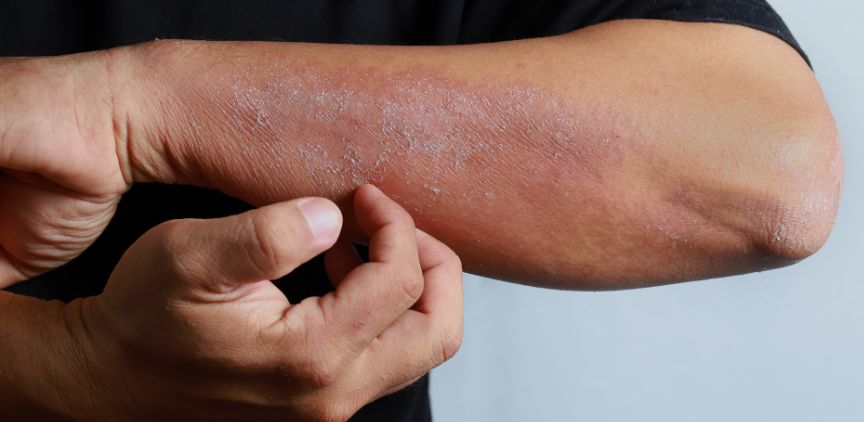Telling Them Apart to Understand a Better Treatment Plan
Eczema and psoriasis are both chronic skin conditions that can lead to red and itchy skin. These skin conditions are often mistaken for each other until a professional diagnosis is made. So, what is the actual difference between eczema and psoriasis? What are some key things to note?
Eczema vs. Psoriasis: What’s the Difference?
Eczema and psoriasis are two different skin conditions with differing causes and slightly different symptoms. The following sections outline these differences in more detail.
Psoriasis Causes vs Eczema Causes
The main difference between these skin conditions is that psoriasis is actually an autoimmune disease, causing malfunctions in the immune system, leading to the accelerated growth of skin cells; this causes the skin to “pile up" and creates scaly and red patches.
Eczema, on the other hand, usually arises due to irritants coming in contact with the skin, which may include allergies, soaps, detergents, or pollen. Yet, there is some evidence showing that genetics play a role in the development of this chronic skin condition. Additionally, eczema flare-ups may occur after infection and with increased stress.
Psoriasis Symptoms vs. Eczema Symptoms
The problem with differentiating between psoriasis, an autoimmune disease, and eczema is their similar symptoms. They have very subtle differences in the level of itchiness and how they look.
Eczema often makes the skin itchy, red, inflamed, and crusty. It primarily occurs on the inner elbows and behind the knees. However, it can also appear on the neck, wrists, and ankles. Many people find the itchiness of this condition quite severe, with many actually scratching their skin until it bleeds.
Psoriasis is characterized by red patches that are more silvery and scaly. These are usually less itchy than eczema rashes. Usually, psoriasis appears on the elbows, knees, scalp, face, low back, palms of the hands, and soles of the feet.
Interestingly, eczema symptoms frequently appear during childhood but may lessen as a person grows into adulthood. With psoriasis, this condition often arises in adulthood or late teens.
Treatment for Ezcema
Mild or moderate eczema, sometimes referred to as atopic dermatitis, is often treated with regular moisturizing and a topical corticosteroid to help inflammation. Your doctor may also recommend emollient cream to reduce itchiness and rehydrate the skin.
For more severe cases of eczema, your doctor may prescribe other medications to help alleviate it. These may include injectables, such as biologics, dupilumab, and tralokinumab. Medications to aid the immune system may also be recommended, such as methotrexate, azathioprine, or cyclosporine.
If stress is a contributing factor, it may also help to explore relaxation techniques, such as deep breathing, meditation, progressive relaxation, or yoga. Light therapy may also help in some cases.
Usually, eczema is a lifelong condition where one must learn to manage symptoms and avoid triggers that cause flare-ups.
Treatment for Psoriasis
With psoriasis, light therapy helps more than in cases of eczema. However, this isn’t the only treatment option.
Treatment for psoriasis may further include:
- Corticosteroids: These help in mild to moderate psoriasis cases, reducing sensitivities and inflammation. This type of treatment may be prescribed as an ointment, cream, gel, lotion, spray, or shampoo.
- Vitamin D Analogues: Vitamin D can help decelerate skin growth, preventing patches from forming and reducing irritation.
- Calcineurin Inhibitors: These medications can help reduce the rash and remove the scaly skin build-up caused by accelerated skin growth. However, these should not be used around the eyes as they can cause damage to the thin skin in this area.
- Salicylic Acid: Shampoos with this ingredient can help decrease the scaling that may occur on the scalp.
- Coal Tar: This may be recommended to lower inflammation, scaling, and inflammation. It comes as a shampoo, oil, or cream.
- Anthralin: This cream help decelerate skin growth, preventing piles of skin and ridding the skin of its scaly appearance.
Oral or injected medication for psoriasis may also involve steroids, retinoids, biologics, methotrexate, and cyclosporine to help alleviate the symptoms of psoriasis. Finding what works may come down to each individual and their specific triggers.
A medical professional, such as a dermatologist, can diagnose eczema and psoriasis. Getting a proper diagnosis is key to obtaining treatment that works and helps you manage your skin condition. Thus, if you’re experiencing chronic or regular rashes, such as those described above, book an appointment with your doctor. They will make the right diagnosis and provide any prescriptions or directions on treatment for you and your situation.
